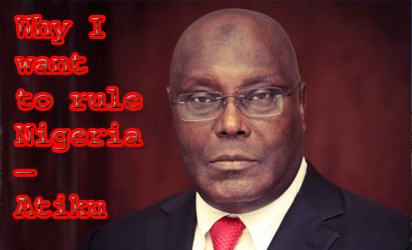
Former Vice President Atiku Abubakar yesterday unveiled his plans for Nigeria if elected as president in next year’s election, promising to offer a matching grant of $250 million each to the 36 States of the federation to challenge them to enhance their internally generated revenue (IGR).
Delivering a lecture entitled, “The Importance of Strengthening State Economic Management Systems,” at the Chatham House in London, Atiku reiterated his call for restructuring of the country not just by constitutional amendments but also by cultural revolution.
He also spoke of plans to improve the operational efficiency of revenue generating agencies.
The ex-Vice President said: “If I have my way, the federal government will match state’s IGR up to $250 million per state. Even with this policy, the federal government will continue to offer support (in the form of intervention programmes) for states that rank below the average development index, until such a time as they are able to become self-sufficient and sustaining.
“Beyond institutional and administrative reforms to improve operational efficiency of the revenue agencies, the federating units will be challenged to double their efforts in rebuilding the fiscal-social contract, by enhancing service delivery in key areas such as health, education, water supply and infrastructural development. Only this would change the predominant perception that government revenues are diverted to the private bank accounts of politicians and their cronies.
“And it is for the purpose of making states lose their addiction to federal allocation, to make them look inwards, and return to the healthy competition of 1957-1966, when Nigeria practiced her unique brand of true federalism known as regionalism, that I suggest the introduction of matching grants to states, that have succeeded in increasing their internally generated revenue.
“My idea is for the introduction of matching grants to be taken from the revenue accruable to the federal government for the purpose of matching the Internally Generated Revenue of each state in order to encourage states to become self-reliant.
The Wazirin Adamawa faulted the inequity in the distribution of federal allocation among the tiers of government in favour of the federal government while also regretting that states have become addicted to monthly federal allocation as a result.
He continued: “In talking about the importance of strengthening state economic management systems, we must identify the structural defects in Nigeria’s federal structure that prevents all levels of the Nigerian government, federal, states and local governments, from operating at optimal levels.
“After nineteen years of uninterrupted democracy in the fourth republic, it is now an indisputable fact that today’s Nigerian states essentially have been reduced to parastatals of the federal government and are addicted to the monthly allocation they receive from Abuja.
“There is nothing as addictive as states that are dependent on their monthly share of revenue from crude oil sales and the only way to get them to manage their economies in an economically viable way, is to cure them of that addiction. Nigeria needs to be restructured.
“We must commit to a new development agenda with focus on wealth creation by the federating units, rather than wealth distribution from Abuja to state and local government capitals. We must undertake far reaching economic reforms to attract private resources, including financial resources and build bigger, stronger and more dynamic sub-national economies.
“We must expand the frontier of private sector activity beyond the realm of the oil sector and build a new Nigeria without oil.”
He also regretted that after the PDP previous administration wiped clean Nigeria’s foreign debt, it has again piled up, to the shame of the nation.
“Why are we saddled with a heavy and almost unsustainable debt burden twelve years after President Olusegun Obasanjo and I provided the leadership that paid off Nigeria’s entire foreign debt of $32 billion in one fell swoop?
“After paying off a monumental debt accumulated by previous governments, the then President Olusegun Obasanjo on April 22, 2006 said “Nigeria will not owe anybody one kobo”. Today, almost exactly 12 years to the day, you can almost say ‘Nigeria is now owing everybody more than one kobo. What happened in the intervening years to turn the dream that our administration had, into this present reality where Nigeria now owes double what we paid off in 2006?”
On his plan for the nation, he added: “There is no alternative to a policy which promotes the growth and diversification of the sub national economies. How much revenue they generate locally from taxes and fees depends on the size and structure of their economies. The bigger and more diversified the better.
“The federal government will create a business-friendly macro-economic environment, through the pursuit of appropriate monetary and exchange rate policies, to leverage private sector investments especially in agriculture to promote economic diversification. Indeed, achieving diversification is central to our economic development strategy. Let us begin to visualize Nigeria without oil or one not predominantly dependent on hydro-carbon.
“Our economic policies will be coherent, consistent and therefore more predictable by the business community. Nothing could be more threatening to investment flows than an environment that is full of policy flip-flops.
“We will ensure spatially balanced investments, through a carefully designed incentive regime, in order to provide more opportunities in the poorer and less endowed federating units.
“The sub-national economies will be assisted in reforming their economic management institutions, including the revenue generating agencies which are seen by many as failed and ineffectually managed institutions within the state service. They need to be reformed and strengthened to make them more innovative and efficient in service delivery. The reformed agencies will be expected to improve tax-payer compliance, develop potentials of non-tax revenue sources and block all leakages associated with tax administration.
“In furtherance of strengthening their economic management systems, another policy I would recommend to Nigerian state is to follow the example President Obasanjo and I laid between 1999 and 2007 when we privatized and liberalized many aspects of the Nigeria economy. It had the almost immediate effects of reducing our wage bill and increasing services, capacity and jobs in the private sector.
“By privatizing those state government owned public enterprises that gulp huge sums by way of recurrent expenditure yet give little returns by way of return on investment, state governments can free more of their revenue from recurrent and devote it to capital expenditure.
“We will promote and insist on fiscal efficiency at the federal level to lead other tiers of government by example. The states will be challenged to adopt sound fiscal management strategy so as to reduce wasteful spending. Many view government spending as wasteful, imprudent and lacking in priorities. Typically, recurrent costs constitute between 60% and 72% of state and local governments.
“As I said in a recent interview, if I had the opportunity, I would disrupt Nigeria’s budgeting process. We would have a budget heavy on capital expenditure. Roads will be built in every state. Mass housing schemes would pop up in every local government area. Railways will be extended to every state capital. Rivers would be dredged to open up the hinterlands of the North.
Licenses would be given to state governments to begin immediate exploitation of resources in their jurisdictions.
 NaijaVibe NaijaVibe | Download Latest Nigerian Music & Mp3s
NaijaVibe NaijaVibe | Download Latest Nigerian Music & Mp3s

![Atiku spotted in Arsenal Jersey [Photo] 3 Atiku spotted in Arsenal Jersey](https://www.naijavibe.net/wp-content/uploads/2013/09/Atiku-spotted-in-Arsenal-Jersey-300x160.jpeg)
